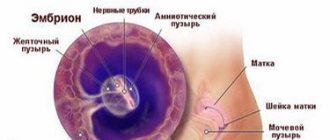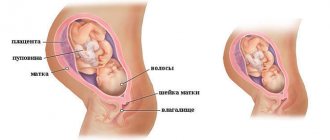Often, expectant mothers complain to their doctor about a pulsation felt in the abdomen. It may seem to them that the child is not just moving, but is having a seizure. This happens at different times and for different reasons. Let's try to figure out why the stomach pulsates during pregnancy and when this is the norm and when it is a violation.
When does a pregnant woman begin to feel the baby's movements?
The first pregnant woman feels the fetus moving already at 18–20 weeks. This is an individual indicator, which depends on how pregnant the woman is (with each new pregnancy, movements are felt earlier and earlier), and on the sensitivity of the expectant mother.
The number of movements of the baby by the 32nd week of intrauterine development is about 85–100 per day, over time their frequency decreases, and by the end of the third trimester there are “only” 50–60 movements per day. A sharp decrease or increase in a child’s physical activity or their cessation indicates a developmental pathology. 10–20 movements within 12 hours are considered a critical indicator. You should monitor changes in the abdomen and, if alarming symptoms are detected, immediately consult a doctor managing the pregnancy.
Why does a child hiccup in his stomach?
Every pregnant woman eagerly awaits the first movements of her baby. Feeling a push or a light touch from your unborn child is an indescribable sensation that will be remembered for the rest of your life. But sometimes the movements of the fetus cause discomfort to the mother or raise questions about whether everything is okay with the baby and why the child is hiccupping in the stomach. Often in late pregnancy, women experience rhythmic movements that are not like usual. In this case, they say that the child hiccups in the stomach.
These differ from the baby’s usual movements, first of all, in their rhythm and duration - a child can hiccup for ten minutes or more. Even if the expectant mother does not experience any unpleasant sensations, she may be concerned about the health of her child, because these movements are unusual and can the baby really hiccup in the stomach? It turns out that it can, but not only expectant mothers, but also doctors cannot find a clear answer as to the reasons for this.
Why does my baby hiccup in his stomach?
According to experts, regardless of the cause, hiccups are not harmful to the unborn baby, and there may be several factors that cause them.
- Maturation of the central nervous system
Hiccups are essentially a rhythmic contraction of the diaphragm, which occurs, among other things, due to pinching of the vagus nerve, which connects the internal organs of the human body. At the same time, a signal appears in the brain that rhythmic contractions can release this nerve. Thus, if a child hiccups during pregnancy, this indicates the final formation of his central nervous system - it can already take control of the control processes of a particular organ or muscle group.
- Preparing for independent breathing and swallowing
Some doctors believe that the fetus hiccups in the abdomen in preparation for independent breathing and the ability to swallow. During hiccups, not only the diaphragm is trained, but also the lungs. The baby swallows amniotic fluid, which irritates the diaphragm and causes hiccups. By the way, if the expectant mother loves sweets, then the baby may hiccup in the stomach often - he may like the taste of the treat, he will swallow more amniotic fluid than usual, and with the help of hiccups he will have to push out the excess.
- Fetal hypoxia
Lack of oxygen in an unborn baby (hypoxia) is a rather dangerous condition for its life and development, and hiccups can be a sign of such a condition. By creating frequent, intense movements, including hiccups, the baby is trying to provide himself with an additional amount of oxygen. Hiccups in themselves are not yet a sign of hypoxia, but if sudden, frequent movements of the unborn child are added to this (and in general the activity of the fetus increases), then you should immediately contact a specialist and undergo the necessary examinations.
Pregnant belly dancing!!! Pregnant belly, dancing.
When might hiccups occur in a baby's stomach?
All of the above causes of hiccups usually occur in later stages of pregnancy. So, the baby begins to learn to swallow at about 28 weeks, and the maturation of the central nervous system occurs by the 32nd week of pregnancy. So, you may notice your baby hiccupping at 33 weeks of pregnancy or earlier.
Do all babies hiccup in their stomach?
Not all babies hiccup, and not all expectant mothers are able to feel these movements. The threshold of sensitivity, the layer of subcutaneous fat and the location of the placenta are different for each pregnant woman, so if the baby does not feel hiccups, this does not mean that he does not do it. In any case, whether the baby hiccups during pregnancy or not is not important. The main thing is that he feels comfortable in his mother’s tummy.
What to do if your baby starts hiccupping?
If your baby's hiccups are felt infrequently and not for very long, then there is no reason to worry. It’s better to talk to your child, calm him down, and if his hiccups cause you discomfort, agree that the little one bothers his mother as little as possible - he may not yet listen to you, but communication will help take his mind off the unpleasant sensations.
If the fetus's motor activity increases, sudden and strong movements coupled with hiccups, you should consult a doctor for examination. This must be done to exclude hypoxia. Usually, an ultrasound is prescribed to study the blood flow of the placenta and fetus, as well as cardiotocography (CTG) to measure the contractions of the baby’s heart and study the activity of the uterus. Usually, hiccupping babies are born without signs of oxygen deficiency, but if hypoxia is confirmed during the examination, treatment is prescribed, and in this case the result will also be positive. You cannot take any medications for hypoxia solely on the basis of your baby’s hiccups, and if your doctor has prescribed treatment without additional examination, then you should think about his competence.
Results
So, let's summarize. For example, if at 35 weeks of pregnancy you notice that the baby is hiccupping, do not worry. If there are no other alarming symptoms of the baby’s development, then regardless of why the child hiccups in the stomach, this process is not harmful to him, but on the contrary, it is physiological and indicates the maturation of the nervous system of the growing organism.
Portal Gnomik.ru
What should be the normal movements of the fetus in the womb?
The movements of the unborn child cause different sensations in women. Some people feel vibration, others feel trembling or fluttering. Sometimes the baby's movements can be mistaken for bowel movements. Over time, the baby grows up, and his movements become more and more noticeable. Usually the movements do not cause concern to the mother, but when the baby is old enough, kicking or punching him in the stomach can become painful. This may indicate that he has adopted an awkward body position.
In the evening and at night, the active time of day begins for the baby in the womb. He begins to move vigorously. During the day, while the mother moves and sways, this calms and lulls him to sleep, but when the woman goes to bed, the swaying stops and the child begins to be active. In order to calm the baby, you can try drinking a glass of warm milk, singing him a song, listening to calm music, stroking his tummy, or changing his body position.
You should not go to bed on an empty stomach, as your child needs nutrition around the clock.
Why does the baby twitch rhythmically?
The origin of vibrations and cramps in the abdomen in pregnant women can be different. The doctor leading the pregnancy determines the cause of this phenomenon, based on a survey and examination. This condition is caused by hiccups, lack of oxygen or other reasons.
Baby hiccups
Indeed, babies often hiccup while in the womb. This phenomenon occurs due to the baby swallowing amniotic fluid. From the second trimester, he makes swallowing movements so that after birth he can breathe and eat. In the process of swallowing amniotic fluid, the muscles are strengthened and the child’s digestive system develops, the intestines train to digest food.
The baby's hiccups are accompanied by rhythmic vibrations of the abdomen, and the woman feels muscle contraction. A diaphragm spasm lasts from a few seconds to an hour and often causes discomfort in a pregnant woman, especially if it occurs frequently and lasts a long time. Some women with a low sensitivity threshold do not feel movements or vibrations.
The child does not have enough oxygen
Another reason why a pregnant woman feels like the baby is twitching in her stomach is the lack of oxygen received through the placenta and umbilical cord. This causes intrauterine fetal hypoxia, it is life-threatening for the child and occurs due to:
- bad habits of a pregnant woman;
- diseases of the expectant mother (anemia, heart disease, pyelonephritis, bronchitis);
- pathologies of pregnancy (hypertonicity of the uterus, placental abruption, Rh conflict, fetal malformations).
Other Possible Causes
There are other reasons for the sensation that the fetus seems to be trembling in the abdomen. The older baby begins to move more actively, reacting to noise. In the first trimester of pregnancy, cramps can be caused by increased intestinal motility, accumulation of gases, and colic. Increased uterine tone causes similar sensations. In the early stages, this can lead to spontaneous miscarriage.
Why does a baby hiccup in its mother's belly?
The most long-awaited and memorable moment of the entire pregnancy is the first movement of the baby. But the closer the beginning of the third trimester, the more often a woman encounters new active movements. Every pregnant woman wonders what their baby is doing at the moment when these rhythmic movements are felt in the abdomen. And they are very surprised when they find out that their baby learned to hiccup while in utero. But you can find out why a child hiccups in the stomach by reading our informative article.
Baby moves and kicks at 26 weeks of pregnancy.
Do babies hiccup in the womb?
Most pregnant women begin to feel their baby's movements during the second trimester (13-27 weeks) of pregnancy. But if the placenta is located closer to the front of the uterus, then it will take longer to feel the first movements. Try not to worry about these early movements. Fetal hiccups are a great indicator that the baby is growing inside you.
How can you tell if your child is hiccupping?
Not all pregnant women can feel that their children hiccup. But the expectant mother does not need to worry prematurely, since the presence or absence of hiccups in the fetus is considered a normal process. Someone begins to feel activity as early as 13 weeks, and some women, even in the second trimester, are not sure that these sensations are caused by the child. To understand that your baby has started to hiccup, you need to listen to the characteristic rhythmic movements inside the abdomen.
What sensations arise?
When hiccups occur, a woman feels slight spasms that are different from other normal fetal movements. The sensations a woman feels when her baby hiccups can last a few minutes or last a long time. Depending on the stage of pregnancy at which you feel your baby's first hiccups, your feelings may vary. The tremors become more distinct as the baby grows inside the abdomen.
Pregnant women describe the following sensations when their baby hiccups:
- Pulsation in the lower abdomen on the left or right
- Monotonous tapping.
- Periodic tremors.
- Vibration of the abdominal skin.
Throughout pregnancy, it is necessary to monitor the baby’s hiccups in order to provide information about fetal movements until the right moment. Some women in the second trimester experience movements that resemble muscle spasms. Starting from the fifth month, the woman feels the powerful blows of the active little tenant. All this information must be recorded in a special table, according to which the doctor will determine the activity of the fetus and identify possible problems.
Possible reasons
You don't need to urgently call your doctor asking why your baby is actively hiccupping in his stomach. Gynecologists recommend not to worry, because this process is considered natural. Just relax and enjoy the feeling of your baby moving inside you. The phenomenon of hiccups in the fetus during pregnancy occurs regularly. Doctors still don’t have a consensus on what causes a baby’s hiccups.
- Assumption No. 1. Compression by the umbilical cord or diagnosis of hypoxia. When the hiccups are intense and repeat daily, the doctor prescribes an ultrasound scan. This is necessary to prevent the possible entanglement of the umbilical cord around the fetus's neck, which limits the flow of oxygen, interferes with breathing and increases not only the baby's increased movement, but also hiccups. If the doctor's fears are confirmed, then compression by the umbilical cord leads to uneven growth of organs and subsequent restriction of blood flow to the fetus.
- Assumption No. 2: Children, while still inside their mother, learn to use their lungs to swallow incoming oxygen through the umbilical cord. While breathing, your baby may swallow some amniotic fluid (amniotic fluid). Fluid entering the lungs sends a signal from the central nervous system to the brain, which causes the diaphragm to contract rhythmically. Therefore, in order to get rid of amniotic fluid that has entered the lungs, children begin to hiccup.
- Assumption No. 3. Sucking reflex. Another hypothesis under which hiccups may appear in the fetus is the development of the sucking reflex. This skill is necessary for the child for future breastfeeding and emotional calm. While thumb sucking in the womb, the baby involuntarily also swallows amniotic fluid, which causes hiccups. The presence of this process in a baby indicates good development of the central nervous system.
What to do if your baby hiccups often?
If hiccups are not repeated regularly, then this phenomenon should be treated calmly, as a normal process of fetal development. But why does a child constantly hiccup in his stomach and what to do about it? First you need to visit a doctor for additional examinations. Only timely medical care will help eliminate developmental defects and ensure the birth of a healthy baby. An examination by a gynecologist consists of the following diagnostic methods:
- In-person consultation - a specialist will conduct a visual examination and ask clarifying questions about the frequency and duration of fetal hiccups.
- Cardiotocography – this test will help measure, feel and hear the child’s heartbeat. If the device detects a rapid heartbeat, the doctor diagnoses the possibility of hypoxia.
- Ultrasound with Doppler - these measurements allow you to assess the state of blood circulation through the vessels of the umbilical cord, the fetal aorta and identify possible dysfunctions of the placenta. If blood flow is reduced, this can become a symptom and sign of hypoxia in the newborn.
Before visiting the doctor, try other effective ways to reduce your child's hiccups. Feeling active movements, tremors in the abdomen, try to relax, stop being nervous and rest more. To reduce your baby's hiccups during pregnancy, we recommend following these recommendations:
- Walking outside every day will help calm your baby's activity.
- When your baby's hiccups prevent you from sleeping all night, change your sleeping position by turning over on your other side or back.
- Get on your knees, focusing on your elbows. Hold this position for a few minutes and then repeat.
- By hiccupping, a baby can show that he is cold. To do this, cover your stomach with a warm blanket.
- Remember to do constant breathing exercises: take a slow, deep breath, and then exhale for 10 seconds.
After meal
The baby's rhythmic movements are affected by the food you took the day before. To reduce the feeling of hiccups in your child, eat less sweets, especially at night, so that the amniotic fluid does not attract him with its sweet taste. An oxygen cocktail, which is sold in pharmacies, will help you replace sweets, but also reduce the baby’s movements. And after eating, do not lie down to rest, but walk around the apartment or take a walk in the fresh air.
Video: How a child hiccups in his stomach
When you feel the baby’s first hiccups in your stomach, try to relax and not worry about it. This process happens to every pregnant woman, but occurs at different times. To understand what a baby’s hiccups inside the abdomen look like, we suggest watching the video. It clearly shows the rhythmic movements and kicks of the baby in the womb of the expectant mother.
Recommended Articles
The cause of vibration is compression of the inferior vena cava
The expectant mother's blood volume increases by 30–40%, so her cardiovascular system is under greater strain. The rapidly growing uterus puts pressure on nearby blood vessels and can put pressure on the vena cava, the largest vessel that transports blood to the heart.
Symptoms of compression of the inferior vena cava:
- changes in blood pressure;
- cardiopalmus;
- dizziness;
- nausea, vomiting;
- tinnitus;
- hypoxia;
- weakness;
- dyspnea.
Symptoms appear when a pregnant woman lies on her back, so if discomfort occurs, you should change your body position without making sudden movements. If the condition improves after this, no additional measures need to be taken, but if the condition worsens, you should seek emergency help.
Pulsation in the lower abdomen during pregnancy
From the moment of registration, your gynecologist will look closely and listen to your tummy at every examination. And even more so, you will direct all your attention to him. Every pregnant woman looks forward to the rounding of her belly, evaluates its shape, size and, of course, analyzes her feelings. Many women are alarmed by pulsation in the lower abdomen during pregnancy, which they feel at different stages. But it is impossible to say for sure what this might be. Firstly, there may be several reasons, and secondly, pregnant women call very different sensations by pulsation: what for some is tapping, moving, moving or contracting, for others it is pulsating. Therefore, with the question of what pulsation in the lower abdomen could mean during pregnancy, it would be best to contact your leading gynecologist. We will consider only the probable causes of this strange and, in some cases, alarming phenomenon.
Aftershocks in Japan
Hello from baby
The vast majority of “experienced” mothers will assure you that pulsation in the lower abdomen during pregnancy is nothing more than fetal hiccups. Doctors will confirm: babies do indeed often hiccup in the womb. This occurs as a result of the baby swallowing amniotic fluid: from the 28th week, he begins to make swallowing movements in order to be able to feed and breathe independently after birth. In the process of swallowing, the muscles are strengthened, the digestive system and gastrointestinal tract of the baby are improved. So it's a kind of training.
Fetal hiccups during pregnancy are accompanied by rhythmic twitching of the tummy, you feel muscle contraction. For everyone, it varies in duration - from a few seconds to an hour. In this case, as a rule, the entire abdomen shudders, although you can feel the “source” only in its lower part. Fetal hiccups often cause discomfort in the expectant mother, especially if they are repeated frequently and do not stop for a long time. And some women do not feel any hiccups at all: this is explained by a lower sensitivity threshold.
Incarceration of the vena cava
The second and most likely reason for the sensation of pulsation in the lower abdomen during pregnancy is not as touching as the first. Doctors are inclined to believe that this is the pulsating vena cava, which runs along the right side of the spine. Depending on the body position of the mother and baby, the vena cava may become compressed, which doctors call “inferior vena cava compression syndrome.” The syndrome begins to appear approximately from the 25th week of pregnancy, although it may be earlier.
When should you consult a doctor?
Short-term pulsations in the abdomen during pregnancy are not an indicator of a threat to the health of the mother and the development of the baby. However, if a woman experiences pain, fever or spotting, she should immediately consult a doctor.
The reasons why a pregnant woman's stomach is shaking may be:
- ectopic pregnancy;
- flatulence;
- abdominal aortic aneurysm (pathology of the vessel wall, characterized by its expansion and stretching);
- hypertonicity of the uterus.
Self-medication while carrying a child is dangerous, since two lives are at risk: the expectant mother and the child. The appearance of signs of pathology should be discussed with your doctor, who will prescribe the necessary examinations and tests, and also prescribe treatment, if necessary.










